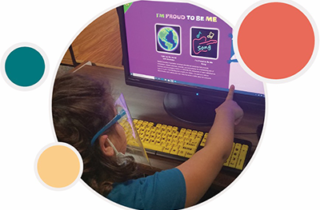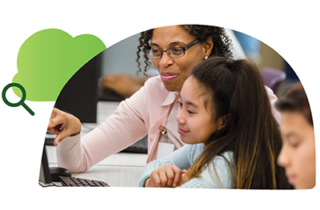When students with disabilities come to your school, the technology that can help them succeed should be immediately available. Therefore, strategies for identifying and selecting accessible and inclusive tech should be top of mind.
While giving all students access to high-speed internet and a working computer are strong steps towards creating equitable learning opportunities, there’s one area schools often miss: technical assistance for students with learning differences.
Presented by Janna Greathouse, District Assistive Technology Coordinator, Jenks Public Schools (OK); Samantha Reid, M.Ed., Educational Technology Coordinator, Jenks Public Schools (OK); and Christine Fox, CITES Project Director, CAST
Presented by Kristin Oropeza, Education Marketing and Community Manager, Common Sense Media; and Jennifer Ehehalt, Sr. Regional Manager, Common Sense Education
Presented by Hall Davidson, Senior Director, Global Learning Initiatives, Discovery Education
Presented by Yusra Obaid, 6-12 STEM Instructional and Technology Curriculum Developer, Bellevue School District (WA); Fred Valdez, Teacher, Listowel District Secondary School, Ontario, Canada; and Megan Turner, Education Lead, Blackbird
Presented by Erin Mote, Co-founder and Executive Director, InnovateEDU; Dan Cogan-Drew, Co-founder and Chief Academic Officer, Newsela; Diane W. Doersch, Director of Technology, Verizon Innovative Learning Schools Program, Digital Promise; and Dr. Courtney Teague, Director of Professional Learning Content and Learner Experience, Verizon Innovative Learning Schools Program, Digital Promise Global
Moderated by Sierra Noakes, Research Project Director, Lifelong Learning Pathways, Digital Promise
Presented by Katie Novak, Ed.D., Founder and Executive Director, Novak Educational Consulting; Mirko Chardin, Education Consultant, Novak Educational Consulting; Rachel Kruzel, Territory Director, Texthelp; and Joni Degner, Territory Director, Texthelp
Presented by Andratesha Fritzgerald, UDL Consultant, Building Blocks of Brilliance, and Author of Antiracism and Universal Design for Learning: Building Expressways to Success; Rachel Kruzel, Territory Director, Texthelp; and Joni Degner, Territory Director, Texthelp
Presented by Scott Bailey, Superintendent, Desert Sands Unified School District (CA); Kelly May-Vollmar, Ed.D., Assistant Superintendent, Educational Services, Desert Sands Unified School District (CA); Dr. Veronica Garcia, Superintendent, Santa Fe Public Schools (NM); and Dr. Tom Ryan, Retired Chief Information and Strategy Officer, Santa Fe Public Schools (NM)
Moderated by Ann McMullan, Project Director, EmpowerED Superintendent Initiative, CoSN (Consortium for School Networking)









